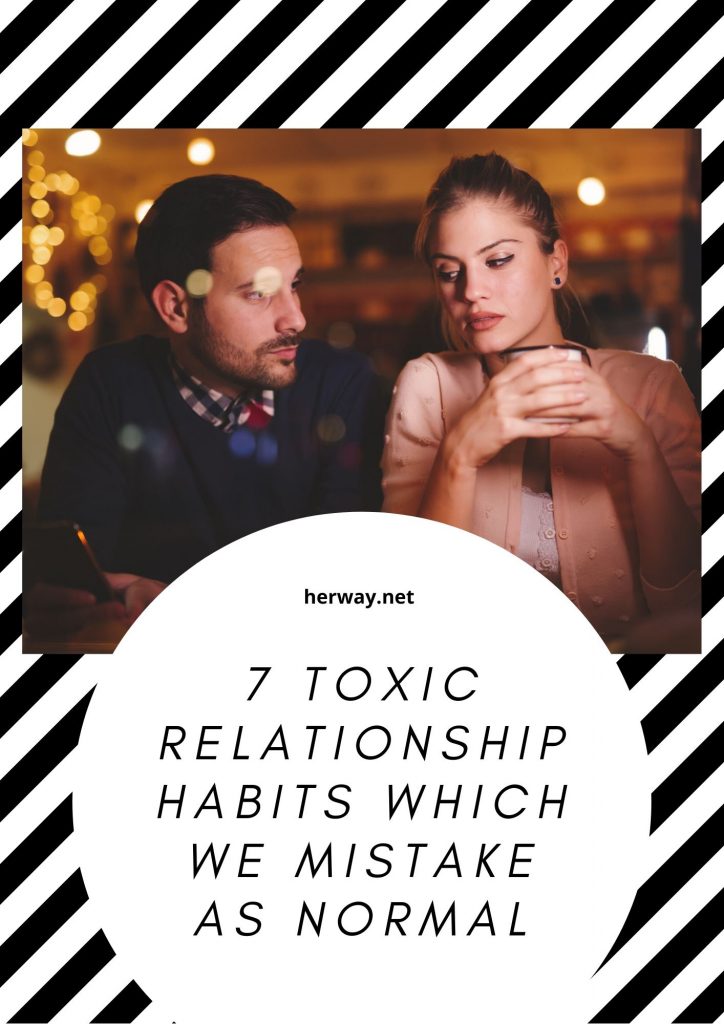7 Abitudini di relazione tossiche che scambiamo come normali
When it comes to other people’s relationships, we are all experts on the subject, but when our own relationship is at stake, we have no idea what to do about it.
Siamo completamente sprovveduti e ciechi.
Someone else’s relationship is displayed to you so clearly.
È possibile vedere tutte le bandiere rosse, anche quelle non pericolose ma potenzialmente tali.
Avete la capacità di rilevare ogni cosa, per quanto insignificante o piccola.
This is actually very fascinating because the same people who point out other people’s mistakes in a relationship don’t see their own.
Al contrario, pensiamo che il nostro comportamento e la nostra relazione siano impeccabili.
Non abbiamo idea che il nostro relazione sta urlando con la tossicità e si sta lentamente spegnendo.
Tutto questo a causa delle cose che riteniamo normali.
Perché scegliamo di ignorare i problemi e di sperare che spariscano.
Questa follia si spinge fino al punto in cui iniziamo a credere che questi abitudini tossiche sono in realtà un bene per la nostra relazione.
L'illusione prende completamente il sopravvento e la relazione si incrina sotto la pressione del tempo. Perché niente di marcio può durare per sempre.
Comunicazione eccessiva

La comunicazione è una delle parti più importanti di ogni relazione sana.
Ma, a dire il vero, bisogna tracciare una linea di demarcazione tra sano e possessivo.
La linea di demarcazione è, in realtà, molto sottile e ci si può lasciar trasportare facilmente, soprattutto all'inizio della relazione.
In that honeymoon phase, it’s more than natural to want to spend every possible second with the person you’re madly in love with.
Il problema si presenta quando questa comunicazione eccessiva diventa un comportamento ossessivo.
Dopo un po' di tempo, uno dei due partner si stuferà sicuramente di dover parlare continuamente con l'altro e di dovergli comunicare i propri piani e i propri spostamenti.
Diventerà un obbligo che porterà al disprezzo.
Evitare il conflitto

Dopo la fase della luna di miele inizia la fase in cui si vedono più chiaramente alcune cose e modelli di comportamento.
Maybe some of them don’t suit you, or you want to change them, but because you’re avoiding conflict to keep the peace and the lovey-dovey phase of your relationship alive for as long as possible, you’re avoiding confrontation.
By doing what you think is best for the relationship, you’re only making it worse.
By saying nothing, your partner will keep on doing what really bothers you because they have no idea it’s driving you crazy.
But in the long run, it’s better to say what is bothering you right away than to try to put up with it.
Tenere dentro le cose che vi danno fastidio porterà lentamente alla fine della vostra relazione.
È un vulcano dentro di voi che aspetta di eruttare.
The longer it’s calm, the worse the eruption will be.
Tenere il punteggio

You and your partner aren’t able to let go of the past.
Therefore, you’re actually keeping score of who screwed up more in your relationship.
Chi ha sbagliato di meno è ovviamente il vincitore.
Questo è sbagliato a molti livelli per la vostra relazione.
First of all, you’re never going to resolve your current issues if you keep on going back to the past.
When one of you makes a mistake, the other one shouldn’t gloat or think that you’re even.
Inoltre, la persona che commette l'errore non dovrebbe mai iniziare a difendersi attaccando il partner e tirando fuori qualcosa che ha sbagliato molto tempo fa.
If both of you keep up with this behavior, you’re only going in circles that will make your relationship hopelessly toxic.
And secondly, by acting like this, you’re only creating more pain.
In other words, you’re manipulating your partner into feeling guilty about their mistakes.
Comportarsi in questo modo non è giusto né positivo a lungo termine.
Il vostro partner finirà per perdere la propria autostima se continuate a metterlo in difficoltà e a farlo sentire uno schifo di proposito.
Comparing them to your ‘old love’

Maybe your partner will find this funny or cute in the beginning, especially if you’re mentioning them in a good or better way than their ex.
Con il tempo, questo può diventare vecchio, vi avverto.
It’s one thing to talk about your ex only in the beginning, but if you keep mentioning them later on, too, you’re going to have a problem.
Even if you’re remembering your old love in a bad way, enough is enough.
It’s time your relationship moves on to another level, in which no one will mention any other person than the two of you.
Un livello in cui contate solo voi due e nessun altro.
Just a heads-up; on that level there is no place for a third person—not even in memory.
Essere passivi-aggressivi

Persone che sono passivo-aggressivo in una relazione hanno chiaramente paura di essere sinceri con il proprio partner.
They are scared to say what’s on their mind and terrified to speak clearly.
Ciò che fanno le persone passivo-aggressive in una relazione è manipolare il partner per fargli capire ciò che stanno cercando di dire, invece di dirlo ad alta voce.
La persona che si sente sicura e protetta con il proprio partner non lo manipolerà mai con la propria opinione.
A person in a healthy relationship won’t feel that insecure, nor they will drop hints about what they want.
Lo chiederanno semplicemente.
Zuccheraggio

If you or your partner have to walk around on eggshells with each other, scared to say something wrong… that’s not a relationship.
That’s BS, pardon my French!
It’s one thing that we have to do that shit every day with different people, strangers in a way, but do we have to do it with our partner as well?
Of course we don’t!
If you can’t be completely honest with your partner, then your relationship is toxic from the beginning.
It has no future, so don’t even try to create one.
Don’t beat around the bush, speak what’s on your mind.
If they seem bothered by your honesty, then it’s them who have a problem and not you.
Gelosia travestita da amore

Sorprendentemente, molte persone definiscono questo comportamento come amore.
Ciò che mi colpisce di più è il modo in cui ignorano volontariamente un comportamento potenzialmente molto pericoloso che potrebbe facilmente trasformarsi in abuso emotivo.
If your partner starts exhibiting strange behavior such as getting pissed when you talk to someone else, especially someone of the opposite sex, that’s a very alarming sign indicating that more serious problems are about to emerge.
Don’t be surprised if they cross over from ‘just being pissed’ to start following you around the city and checking your phone or your emails.
La gelosia è una malattia grave, capace di diffondersi molto velocemente fino a distruggere una relazione un tempo felice.
Come interrompere le abitudini tossiche mascherate da normali?

It’s easy to start a relationship, anyone can do that.
La parte difficile è mantenere il rapporto sano e vivo; questo richiede molto impegno e, soprattutto, non bisogna mai smettere di provarci.
When you’re in a happy phase, it’s easy to be happy and keep things positive.
It’s easy to have faith in someone when everything is running smoothly.
Ma la vostra relazione sopravviverà sia nel bene che nel male se entrambi continuerete a provarci anche quando tutto intorno a voi sta crollando.
When things are going south, it’s a real challenge to remain positive.
It’s too easy for a relationship to turn into a toxic one.
It doesn’t take much for things to go to shit.
La risposta definitiva alla domanda su come interrompere le abitudini tossiche è: "Non è possibile":
1. Smettere di mentire a se stessi
2. Capire prima se stessi e poi la relazione
3. Maturità
Ecco fatto.
Le tre risposte chiave alla domanda precedente.
Possono sembrare semplici e facili da realizzare, ma richiedono molto lavoro.








